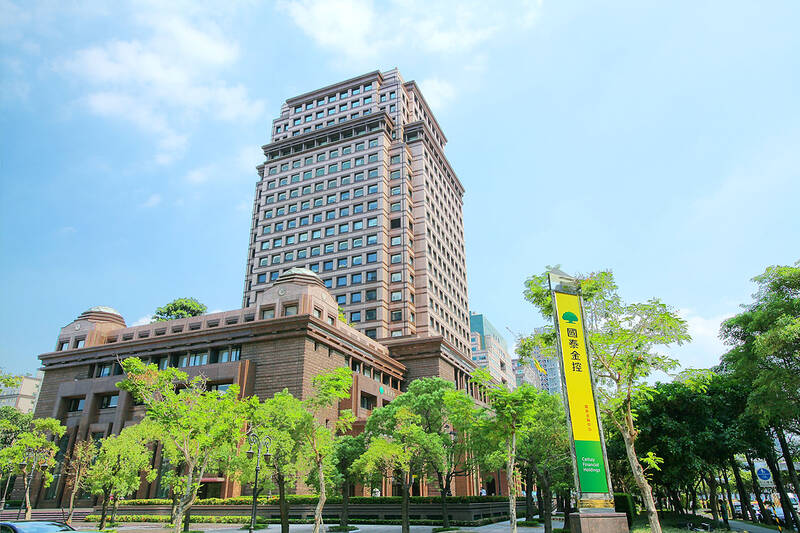Cathay Financial Holding Co (國泰金控) on Thursday said it would issue 1.5 billion common shares to raise new capital, with an aim to boost the financial strength of its life and property insurance subsidiaries, which were struck by key interest rate hikes and a huge number of COVID-19 compensation claims.
Cathay Financial is to receive proceeds of NT$39 billion to NT$60 billion (US$1.2 billion to US$1.9 billion), as the new shares were priced at NT$26 to NT$40 each, corporate data showed.
That would be the largest capital financing project ever launched by the company. Cathay Financial raised NT$42 billion by issuing 700 million preferred shares at NT$60 each in June 2018, corporate data showed.

Photo: Cathay Financial Holding Co
Cathay Financial’s equity-to-asset ratio dipped to 2.63 percent at the end of last month, as hiked interest rate hikes at central banks worldwide led to price declines of foreign bonds, which cut the valuation of the life insurer’s fixed-income investment, the data showed.
Equity-to-asset ratio is a solvency measure, and all life insurers are required by the Financial Supervisory Commission (FSC) to maintain an equity-to-asset ratio higher than 3 percent.
Cathay Financial would use the proceeds to inject NT$35 billion into Cathay Life Insurance (國泰人壽) and NT$10 billion into Cathay Century Insurance Co (國泰世紀產險), by subscribing all their new shares, the company said in a filing to the Taiwan Stock Exchange (TWSE).
Cathay Life planned to offer 500 million new shares at NT$70 each, to supplement its capital and boost its equity-to-asset ratio, it said in another statement to the TWSE.
Cathay Life’s board members on Thursday approved the proposal to reclassify its financial assets, a change that would boost its equity-to-asset ratio to 5.78 percent, with the reclassification dating back to Oct. 1, the statement said, adding that shareholders’ equity would increase by NT$242.6 billion the end of last month.
Cathay Life is the second local life insurer seeking to free itself from deteriorating financial reports by reclassifying assets, following the steps of Nan Shan Life Insurance Co (南山人壽) last week.
Cathay Financial’s share price retreated 3.43 percent to NT$36.55 in Taipei trading yesterday, with investors concerned that the capital injection could signal a dilution in profit, TWSE data showed.
The injection is expected to strengthen the capital adequacy of its insurance units and help protect against volatility in the financial markets, Moody’s Investors Service analyst Kelvin Kwok (郭嘉銘) said in a note yesterday.

CHIP WAR: Tariffs on Taiwanese chips would prompt companies to move their factories, but not necessarily to the US, unleashing a ‘global cross-sector tariff war’ US President Donald Trump would “shoot himself in the foot” if he follows through on his recent pledge to impose higher tariffs on Taiwanese and other foreign semiconductors entering the US, analysts said. Trump’s plans to raise tariffs on chips manufactured in Taiwan to as high as 100 percent would backfire, macroeconomist Henry Wu (吳嘉隆) said. He would “shoot himself in the foot,” Wu said on Saturday, as such economic measures would lead Taiwanese chip suppliers to pass on additional costs to their US clients and consumers, and ultimately cause another wave of inflation. Trump has claimed that Taiwan took up to

A start-up in Mexico is trying to help get a handle on one coastal city’s plastic waste problem by converting it into gasoline, diesel and other fuels. With less than 10 percent of the world’s plastics being recycled, Petgas’ idea is that rather than letting discarded plastic become waste, it can become productive again as fuel. Petgas developed a machine in the port city of Boca del Rio that uses pyrolysis, a thermodynamic process that heats plastics in the absence of oxygen, breaking it down to produce gasoline, diesel, kerosene, paraffin and coke. Petgas chief technology officer Carlos Parraguirre Diaz said that in

SUPPORT: The government said it would help firms deal with supply disruptions, after Trump signed orders imposing tariffs of 25 percent on imports from Canada and Mexico The government pledged to help companies with operations in Mexico, such as iPhone assembler Hon Hai Precision Industry Co (鴻海精密), also known as Foxconn Technology Group (富士康科技集團), shift production lines and investment if needed to deal with higher US tariffs. The Ministry of Economic Affairs yesterday announced measures to help local firms cope with the US tariff increases on Canada, Mexico, China and other potential areas. The ministry said that it would establish an investment and trade service center in the US to help Taiwanese firms assess the investment environment in different US states, plan supply chain relocation strategies and

WASHINGTON POLICY: Tariffs of 10 percent or more and other new costs are tipped to hit shipments of small parcels, cutting export growth by 1.3 percentage points The decision by US President Donald Trump to ban Chinese companies from using a US tariff loophole would hit tens of billions of dollars of trade and reduce China’s economic growth this year, according to new estimates by economists at Nomura Holdings Inc. According to Nomura’s estimates, last year companies such as Shein (希音) and PDD Holdings Inc’s (拼多多控股) Temu shipped US$46 billion of small parcels to the US to take advantage of the rule that allows items with a declared value under US$800 to enter the US tariff-free. Tariffs of 10 percent or more and other new costs would slash such